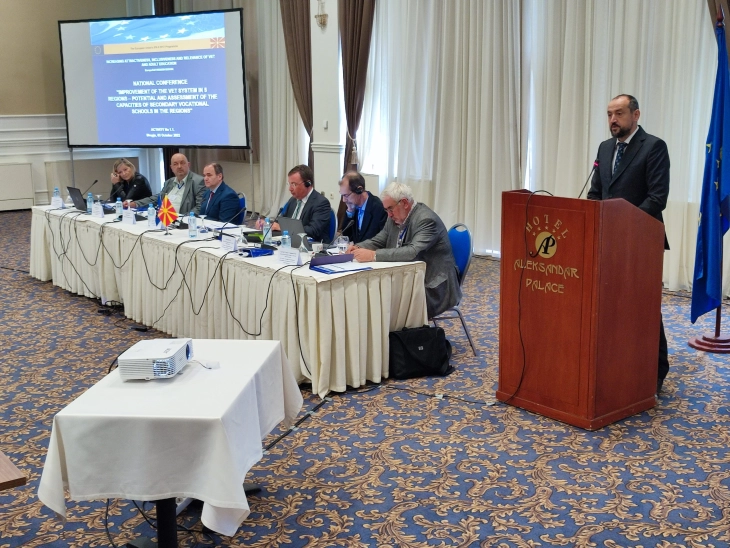Bytyqi: Vocational schools pillars for development of education

Skopje, 3 October 2022 (MIA) – Deputy PM for Economic Affairs Fatmir Bytyqi delivered Monday remarks at the national conference "Improving the Vocational Education and Training (VET) system in 5 regions - potential and assessment of the capacities of secondary vocational schools in the regions."
“Over 90% of the unemployed in the country are functionally illiterate or non-functionally literate, and 63% of them have no or incomplete primary education. We have to talk about this, it's a decades-old problem and very important. The concept of lifelong learning, qualification and re-qualification is a reality that everyone must accept. We need to point to employability, to measure employees’ qualifications needed for the modern labour market that no longer refers to heavy industry, but robotics, mechatronics and artificial intelligence,” Bytyqi said.
Deputy PM Bytyqi noted that secondary vocational schools are perhaps the pillar for the development of education, and young people, the labour market and migration are the three interrelated factors that must be seen integrally.
According to the Deputy PM, situation should be discussed openly and the problems should be clearly pointed out, otherwise progress cannot be achieved. Now that we started the screening process, we need to accurately and honestly map out strong points and weak sides and to work on with a lot of intention, but also understand that we are not doing it all for someone else, but for us, for our future and our development.
“Young people, the labour market and migration are the three interrelated factors that must be seen integrally. And if we fail to address their complexity, we will wonder in the next 30 years what we're doing wrong. But as long as we don't speak with facts, with the truth or the reality of the situation, we will not achieve the progress,” Bytyqi noted.
Deputy Education Minister Ljuljzim Aliu said that one of the biggest challenges for the country is the strengthening of the human capital for inclusive economic development.
“The quality of education is the basis for the development of human capital, reform processes in the national education system, however, additional investments are needed to improve the learning process. One of the innovations is the national assessment of the testing which will fulfill the conditions of monitoring, the evaluation of the success of students in primary schools at the national level,” Aliu said.
He pointed out that an essential reform has begun in vocational education with the aim of forming young people’s orientation to meet the labour market needs. Last school year in all secondary vocational schools, there were 97 classes for dual education and more than 1,400 students. This year there are more than 200 classes for dual education and 2,700 students, last year there were 250 companies involved, and this year there are over 400 companies involved in this process.
“Part of the changes undertaken with the establishment of the regional vocational education centers at the national level are aimed at innovation culture at the regional and national level. The focus is to invest in developing learning communities by bringing together pupils, students, teachers, parents and the business community. For this purpose, the concept for the development of regional centers for vocational education and training was officially adopted in accordance with the 2018/2025 education strategy in April. The concept was prepared at the initiative of the Ministry of Education and Culture, and it began by conducting research on the educational offer and market demand for skilled workforce. Moreover, consultations were held with international and national stakeholders. In this regard, I believe that today's analyzes are based on a large number of consultations with all stakeholders involved in this process,” Aliu stressed.
The importance of the exchange of information, he added, was also seen within the framework of the social dialogue that the Ministry of Education and Science conducts with the business community, vocational schools and local governments.
“By implementing "Learn smart, work professionally" campaign over the past two years, local needs for certain professional profiles have been identified, which are already part of the enrollment policy for secondary vocational schools. It was in cooperation with the business community and the Economic Chamber that the value of the concept of dual education was reiterated,” Aliu said, adding that regional vocational education and training centers should be leaders in promoting this educational concept.
He also added that today’s remarks from the extensive research work done in the project in five selected regions: Vardar, Eastern, Pelagonia, Southeast and Skopje will represent a solid basis for strengthening the reform processes in the area of vocational education and training.
National conference "Improving the Vocational Education and Training (VET) system in 5 regions - potential and assessment of the capacities of secondary vocational schools in the regions” is organized within project “Increasing Attractiveness, Inclusiveness and Relevance of Vocational Education and Training (VET) and Adult Education” designed to improve skill matches of youth and adults in line with the labour market needs by increasing access to quality Vocational Education and Training (VET) and Adult Education in the country.







